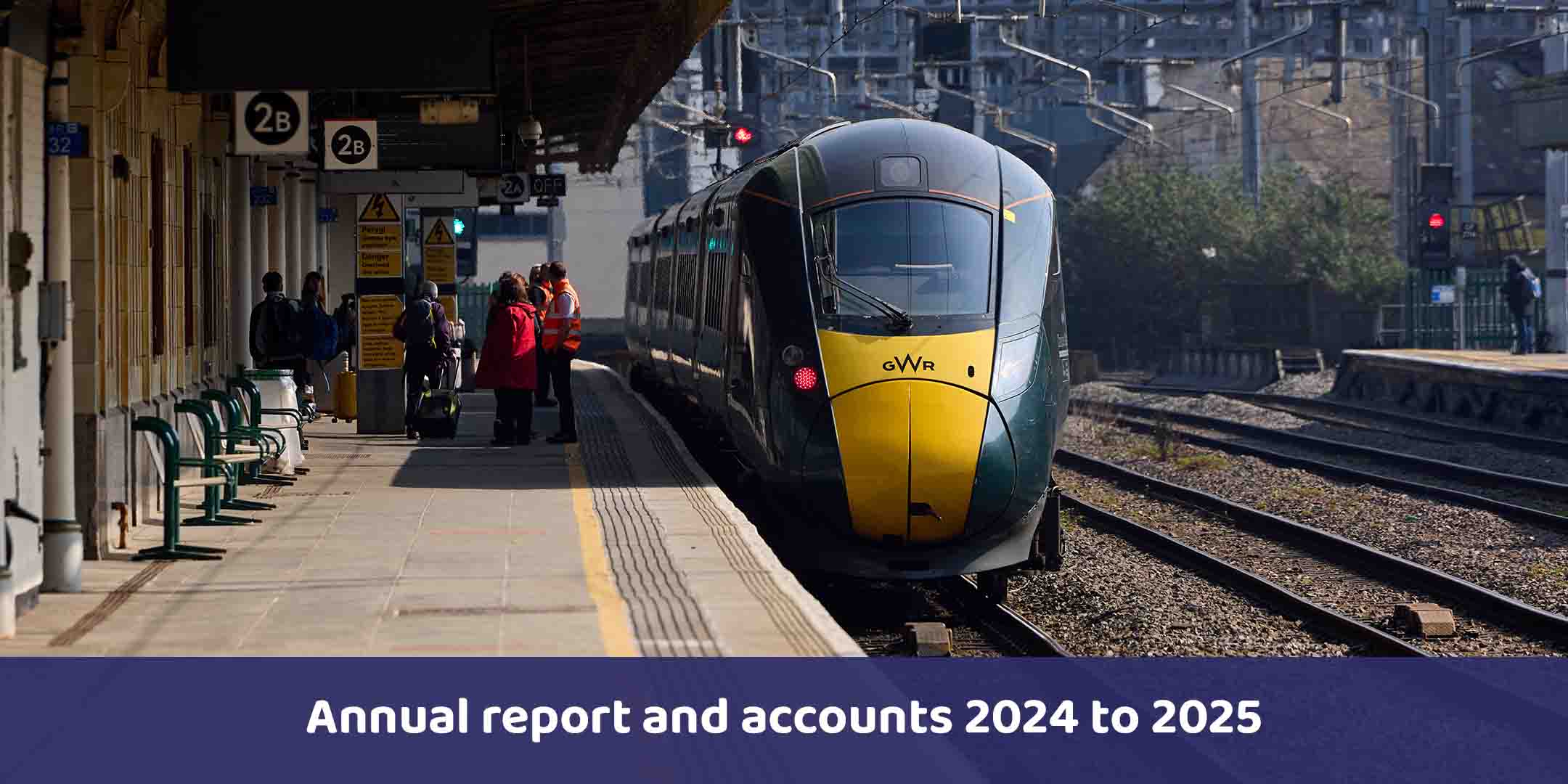For the period 1 April 2024 to 31 March 2025.

- Report presented to Parliament pursuant to section 74(3) of the Railways Act 1993
- Accounts presented to the House of Commons pursuant to section 6(4) of the Government Resources and Accounts Act 2000
- Accounts presented to the House of Lords by Command of His Majesty
- Ordered by the House of Commons to be printed on 15 July 2025
Preface
About this annual report and accounts
This document integrates performance and financial data to help readers gain a better understanding of the work of the Office of Rail and Road (ORR). It covers the activities of ORR from 1 April 2024 to 31 March 2025 and is split into three main sections:
- The performance report includes a summary of progress achieved in 2024-25 in delivering our strategic objectives and service standards (the performance overview), followed by a fuller review of delivery of our strategic objectives (the performance analysis).
- The accountability report is split into three sub-sections and includes:
- A corporate governance report, which includes the directors’ report, the statement of Accounting Officer’s responsibilities and a governance statement;
- A remuneration and staff report, which includes pay and benefits received by executive and non-executive Board members and details of staff numbers and cost; and
- A parliamentary accountability and audit report, which allows readers to understand ORR’s expenditure against the money provided to it by Parliament by examining the statement of outturn against Parliamentary Supply and includes a copy of the audit certificate and report made to Parliament by the head of the National Audit Office, setting out his opinion on the financial statements.
- The financial statements show ORR’s income and expenditure for the financial year, the financial position of ORR as of 31 March 2025, and additional information designed to enable readers to understand these results.
Chief Executive’s report

This year we continued to focus on securing safety, value and performance from the sectors we regulate. As well as this, we have continued to support the Government on rail reform, delivering, for example, preparatory work to enable the necessary safety permissions as English passenger train operators move into public ownership, and advising Government and working with stakeholders as the legislative plans for Great British Railways progress.
We supported the Government’s growth agenda with a new piece of work on how to encourage more direct private investment into railway infrastructure. As part of the government’s regulatory reforms, we began engaging with infrastructure managers on how to reduce the administrative burdens we impose and started a review of the service standards that we work to.
Our work to drive a better service for passengers who need support when travelling continued, with an important report at the start of the year on disabled passengers’ experience of making complaints. We found inadequate standards of service and some non-compliance with the complaints code of practice and our accessible travel policy guidance and so asked all operators to report on the improvements they plan to make to rectify issues for disabled passengers.
Train performance also continued to be a key area of focus and, following our investigation into deteriorating performance across Network Rail’s Wales & Western Region, we required the company to produce a robust improvement plan. We were pleased to see an increase in reliability for all users by the end of the year. We asked Network Rail’s Eastern Region to follow a similar whole-system approach to address its own performance issues and to work with all stakeholders to deliver a comprehensive improvement plan.
As the combined safety and economic regulator, we reviewed how costs and benefits are assessed for safety initiatives and identified important learning points for ourselves and the rail industry to deliver best practice. Our economics team also reported on productivity – a major driver of economic growth and value – across the whole rail industry, providing a useful baseline as we look ahead to rail reform.
We successfully concluded the prosecutions of Network Rail for breaches of health and safety law that led to the tragic track worker fatalities at Margam East Junction and Surbiton. Network Rail received significant fines for both incidents.
John Larkinson, chief executive and accounting officer
Chair’s report

The past year has continued to be a period of change and transformation for the rail and road industries and ORR’s work to facilitate the implementation of government policies, while protecting the interests of current and future users and the taxpayer, has remained as vital as ever.
In the current environment, I am pleased that ORR is recognised as a trusted and independent source of expert advice to government, particularly in support of economic growth and industry and regulatory reform.
Over the past 12 months we have brought our expertise to bear as Great British Railways has taken shape and the first train operating companies have moved into public ownership. We have focussed on driving efficiencies in the industry and our own operations and have worked to create the right environment for investment in rail and road infrastructure. Our response to government requests to identify specific areas where regulation could assist with economic growth was welcomed by the Chancellor and HM Treasury, as was our advice on Transport for London’s funding, and we continue to take action in these areas.
The external operating environment remains challenging, however – from rising costs to the visible impacts of climate-related extreme weather events. Our work with all industry stakeholders to support performance, productivity, safety and resilience has therefore continued to be core to our work throughout the year.
ORR has a prominent role in looking out for all passengers and users of rail and road, as well as the funders of these vital networks. For example, there have been some key pieces of work done to foster competition in the rail sector, such as on international rail routes and station catering concessions. Our review of revenue protection policies, in response to the Secretary of State’s request last year, is another example of driving improvements in the interests of passengers, the rail industry and taxpayers.
When it comes to how ORR operates, it has been important in the current climate of change that we continue to be a reliable and ethical source of independent interventions, advice and resolution where required, drawing on the skills and experience of colleagues. But flexibility, innovation and responsiveness are also essential, as is the modernisation of our internal processes and systems, in line with civil service efficiency drives. The Board has therefore been pleased to support continued investment in training and diverse talent; greater use of technology to improve ways of working; and more cross-departmental collaboration to contribute new ideas and approaches.
Regarding the ORR Board, we are currently in a period of renewal, with the terms of office of two of our most experienced non-executive directors expiring, and a campaign now under way to recruit replacements, which we expect will deliver valuable new capabilities and skill sets.
I would like to thank my colleagues on the Board, particularly our retiring Board members, and also, last but certainly not least, all ORR staff for their hard work over the past year.
Declan Collier, Chair

